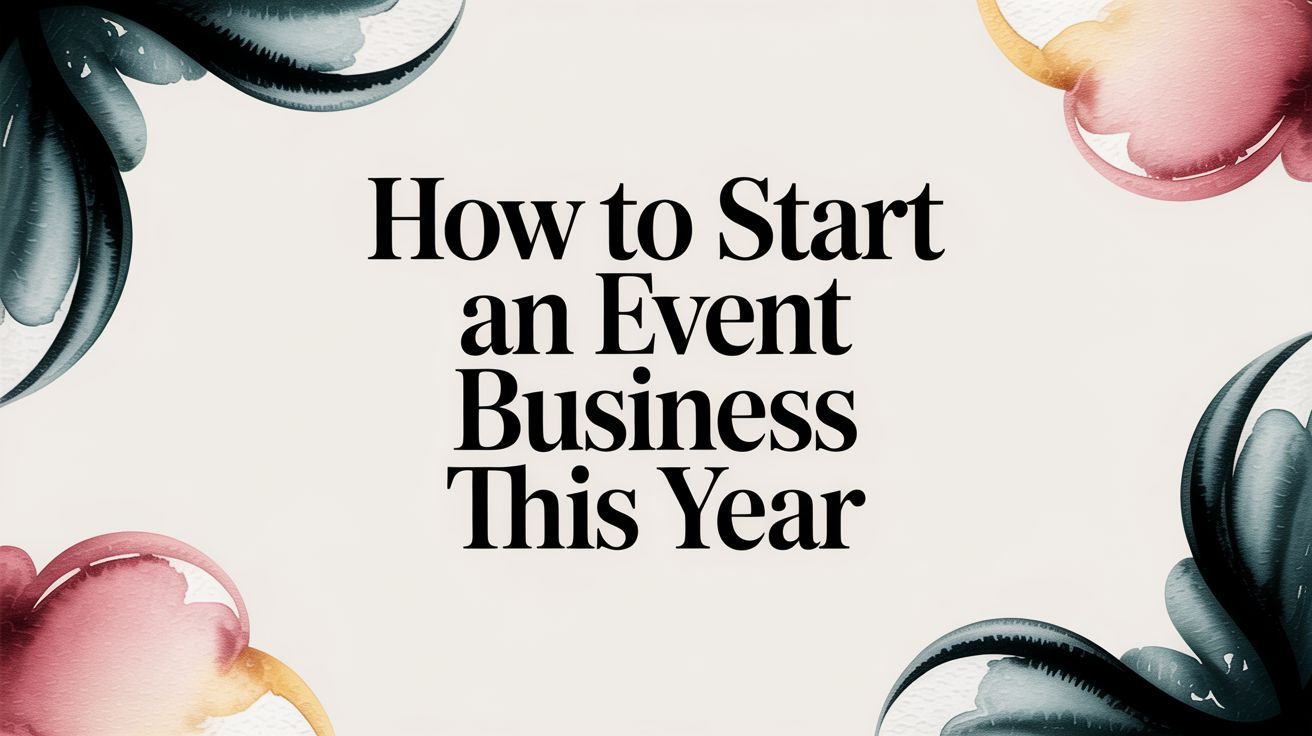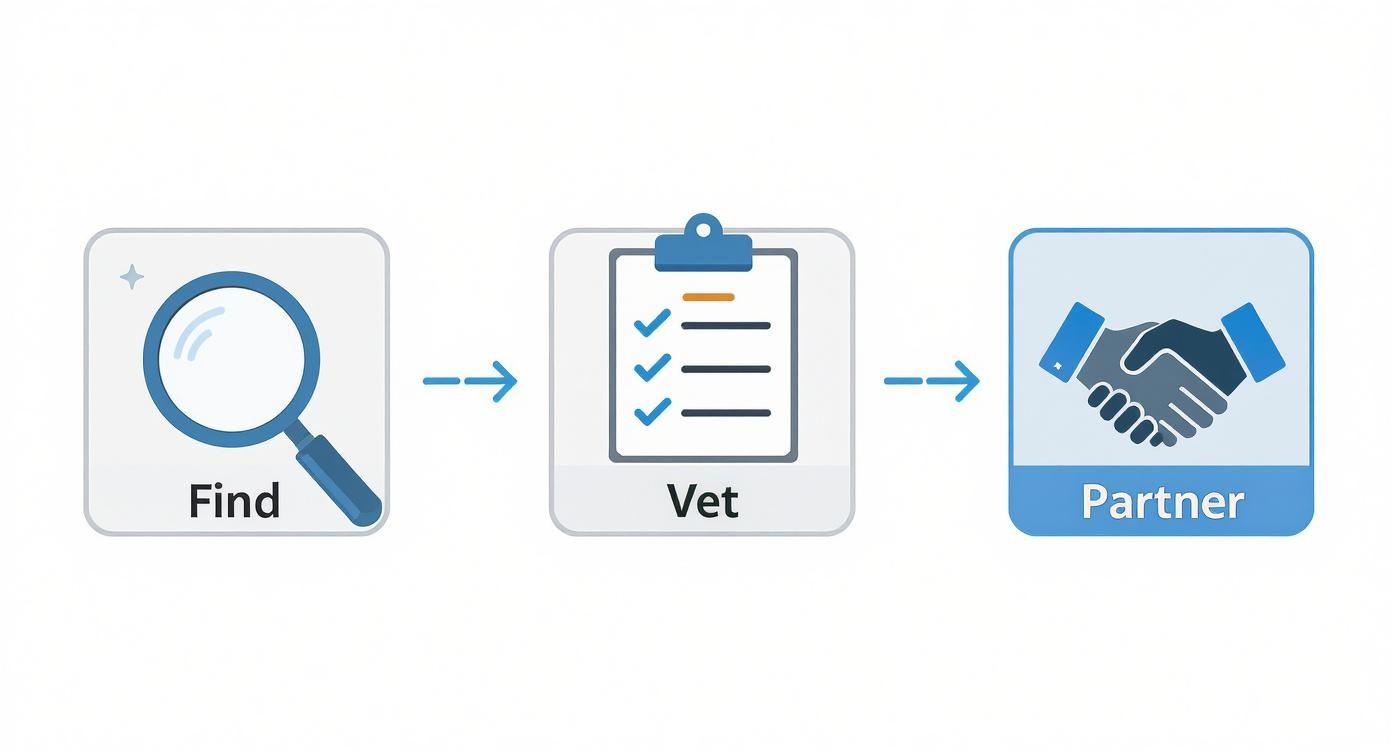How to Start an Event Business This Year

So, you want to start an event business. Good. But before you pick a business name or design a logo, we need to talk about the single most important decision you'll make: your niche.
Let's cut the fluff. Trying to be the event planner for "everyone" is a business death sentence. You’ll be a generalist in a sea of other generalists, constantly explaining your value and competing on price. The real money, and the real satisfaction, comes from being the obvious, go-to expert for a very specific type of event.
Find Your Niche Before You Do Anything Else

Think of it this way: if you're a craft brewery planning a three-day, ticketed beer festival, who do you hire? The generic planner who did a kid's birthday party last week? Or the person whose entire business is built around producing unforgettable festivals for craft beverage brands? The specialist wins. Every time. They already know the right security firms, have relationships with ticketing platforms, and can anticipate a dozen problems a generalist wouldn't even see coming.
This one decision—your niche—drives everything else. Your pricing, your marketing, your website copy, the vendors you work with, and the clients you attract. It’s the first domino.
Why a Niche Is Non-Negotiable
Picking a lane simplifies your entire operation. Instead of juggling the needs of a dozen different client types, you become exceptionally good at solving one type of problem for one type of client. That focus is your strongest marketing asset.
Here's why it works:
Marketing Gets Easier. You know exactly who you're talking to, where they are, and what their specific pain points are. Your message cuts through the noise.
You Can Charge More. Specialists are experts, and experts command higher rates. Clients pay a premium for someone who truly understands their world.
Vendor Relationships Become an Asset. You'll work with the same handful of top-tier photographers, caterers, and AV companies repeatedly. This builds trust, efficiency, and often leads to better pricing.
You Get Better Referrals. Do a great job for a tech startup, and they'll tell other tech startups. Your client base starts to build itself.
The global events market is worth over $1 trillion. It’s a huge pie. Your niche is how you carve out a profitable slice for yourself. You can dig into more of these industry growth stats on eventgroove.com.
How to Uncover Your Perfect Niche
Finding a niche isn't about some mystical flash of inspiration. It’s a practical exercise at the intersection of three things: what you're genuinely interested in, what you're good at, and what people will actually pay for. You need all three.
Start by asking blunt questions. What topics do you obsess over? If you’re a cycling fanatic, maybe your niche is multi-day charity bike races. What are your actual skills? If you have a background in corporate logistics, planning complex academic conferences is a natural fit.
Don't chase trends. A niche built on a fleeting fad will die with it. Build on something you actually care about. You're going to be immersed in this world day in and day out. It’s better if you don't grow to hate it. The goal is a profitable business that doesn't feel like a grind.
Got an idea? Now, test it. Is there a real, paying audience for this? Is the market underserved, or are you the tenth person trying to do the exact same thing? An idea without paying customers is just a hobby.
A strong niche solves a specific problem for a specific group. Don't be "a wedding planner." Be the planner for "adventurous elopements in national parks" or "multi-day, destination Indian weddings." Those are businesses.
Your Niche Validation Checklist
Before you commit, run your idea through this gauntlet. This is how you separate a real business from a daydream.
| Validation Question | How to Find the Answer |
|---|---|
| Is there a paying audience? | Search Eventbrite and Meetup for similar events. Are people actually buying tickets? |
| Who are my top 3 competitors? | Google your niche (e.g., "corporate wellness retreat planner"). Who’s on page one? What are they doing right and wrong? |
| What makes my idea different? | Look at the competition. Is there a gap? Can you offer a better experience, serve a more specific micro-niche, or simplify the process? |
| Is this audience reachable? | Where do these people congregate online? Find the relevant Facebook Groups, subreddits, trade publications, or Instagram influencers. |
| Can I build a business around this? | Brainstorm three clear service packages. Can you create a valuable offer that solves a real problem for your target client? |
Answering these questions moves you from a fuzzy concept like "I want to plan events" to a sharp business idea like "I produce exclusive pop-up dinner series for B2B tech companies in the Bay Area." Now that's a business.
Create a Business Plan That You'll Actually Use

Forget the 50-page business plan from college. It’s obsolete the moment you print it. For a new event business, you don't need a novel; you need a simple roadmap. A one-pager.
This isn't to impress a bank—it's for you. It’s a tool to keep you honest about who you serve, what you sell, and how you make money. It’s your guide for every decision, from website copy to pricing quotes. Keep it lean, post it on the wall, and update it as you learn. It's about clarity, not complexity.
Define Your Core Offerings and Ideal Client
First, get brutally specific about what you’re selling and to whom. "Event planning services" is useless.
Let's stick with our niche: "pop-up dinner series for B2B tech companies." Your core services might be:
Full Production: The "we handle everything" package. You source the private venue and chef, manage the guest list and RSVPs, and run the show on-site.
Venue & Vendor Curation: A lighter package for companies that have a team but need your insider connections to find the perfect, non-obvious venue and private chef.
On-Site Management: For clients who've planned the event but need a professional to execute it flawlessly so their own team can network.
Next, profile your ideal client. Go beyond demographics. What is their job title? (e.g., "VP of Marketing," "Head of Sales"). What’s their biggest pain point? (e.g., "Our sales team needs a unique way to build real relationships with C-level prospects, and boring steak dinners aren't cutting it.") When you know their problem, you can sell them the solution.
Your business plan isn't a static document; it's a living guide. It should answer three simple questions at a glance: Who do we help? What problem do we solve for them? And how do we do it uniquely? If you can't answer those, stop and figure them out before moving on.
Choose a Pricing Model That Fits Your Niche
Pricing is where new planners get stuck. They undercharge out of fear or pick a model that doesn't fit their service. The model should match the work.
There are three common models.
Flat Fee: You charge one fixed price for a project with a clearly defined scope. This is ideal for repeatable events. Our "pop-up dinner" planner might charge a flat $8,000 fee because they know the process inside and out. Clients love the certainty.
Percentage of Event Budget: You charge a percentage of the total event spend—usually 15-20%. This is standard for large-scale events with many variables, like a multi-day conference or a big wedding. If a client's budget is $250,000, your 18% fee is $45,000. This ensures your compensation scales with the complexity.
Hourly Rate: You charge for your time. This is best for consulting or for projects with an undefined scope. A planner might charge $200/hour for initial strategy sessions before building a full flat-fee proposal.
And if you’re running ticketed events, choosing the best way to sell tickets online is part of your pricing strategy. High fees can kill your profit margin.
Map Your Startup Costs and First-Year Goals
Last step: a simple financial sketch. No complex spreadsheets needed. Just list the bare essentials to get started.
Your startup costs might look like this:
Business Formation: LLC registration ($100 - $500).
Insurance: General liability coverage. Non-negotiable ($400 - $700/year).
Website: Domain, hosting, and a simple, professional template ($300 - $1,500).
Basic Software: Client management, proposal software.
Speaking of software, the industry is built on it now. Around 79% of event planners use an Event Management System (EMS). Don’t try to run this business on spreadsheets and sticky notes. A solid tech stack is a requirement, not a luxury.
Now, set a simple, realistic first-year revenue goal. Let's say your startup costs are $2,000 and you want to make $60,000 in profit. Your revenue target is $62,000. Work backward. If your average flat-fee project is $8,000, you need to book about 8 projects all year. That’s it. Breaking it down makes the big goal feel achievable. That's what a good plan does.
Getting Your Business Legal and Legit
Let's get the boring-but-critical part out of the way: the legal setup. It’s not exciting, but it’s the foundation that separates a real business from a side hustle. Getting this right from day one protects you, builds client trust, and prevents future catastrophes.
Choosing Your Business Structure
You need to decide how your business will legally exist. This affects your taxes and, more importantly, your personal liability. For most new planners, it boils down to two options.
Sole Proprietorship: This is the default. If you start working, you're a sole proprietor. It's free and easy. The downside is massive: there is zero legal separation between you and the business. If the business is sued, your personal assets—your house, your car, your savings—are on the line.
Limited Liability Company (LLC): This is the smart choice. An LLC creates a legal wall between your business and personal assets. If the company gets into debt or is sued, your personal finances are generally protected. It costs a few hundred dollars to set up and requires minimal annual paperwork, but the peace of mind is worth every penny.
Just form an LLC. Seriously. The small upfront cost is the best investment you'll make in your own financial security. Don't overthink it, just do it.
Get the Right Permits and Licenses
With your structure in place, you need the government's permission to operate. Requirements vary by city and state, so start by Googling "[Your City] business license requirements."
You’ll probably need:
General Business License: Most cities require this to operate any business.
"Doing Business As" (DBA) Name: If you're an LLC but operate under a different name (e.g., your company is "Jane Doe LLC" but your brand is "Evergreen Events"), you'll need a DBA.
Event-Specific Permits: These are usually secured per event, like permits for alcohol service, road closures, or amplified sound in a public space.
Don't skip this. The fines for operating without the proper licenses can be crippling.
Separate Your Finances and Get Insured
This is non-negotiable: open a separate business bank account. Do not mix your business and personal finances. Ever.
Commingling funds is a bookkeeping nightmare and can "pierce the corporate veil," nullifying the legal protection of your LLC. A dedicated business account makes tax time simple and gives you a clear picture of your company's financial health. It’s a sign that you’re a professional.
Finally, get insured before you do anything else. You need General Liability Insurance. This covers you for things like bodily injury or property damage. If a guest trips over a power cord or your caterer scratches a venue's floor, this policy saves you.
Most professional venues won't even work with you unless you can provide a Certificate of Insurance (COI). A policy typically costs $400 to $700 a year. It's one of the most important checks you'll write.
Build Your Network of Venues and Vendors
An event business is a team sport. You are only as good as your vendors. You can be the most organized planner in the world, but if the photographer misses the shot or the caterer is late, you look bad. A curated network of reliable partners isn't just a contact list; it's the most valuable asset you have.
These relationships are your competitive advantage. A go-to list of pros who match your niche and deliver consistently allows you to execute flawless events and makes you look like a miracle worker to your clients.
Finding Your Core Team
Your vendors must align with your niche. If you plan high-tech corporate product launches, you need AV companies on the cutting edge, not the DJ from the local wedding circuit. Your partners must speak the same language as your clients.
Start your search online, but don't stop there. Instagram and Pinterest are great for finding vendors with a strong visual identity that matches yours. Follow them, see who they work with, and get a feel for their work.
Then, get offline.
Go to Industry Events: Show up at venue open houses and networking events for your specific niche. Shake hands. Make real connections.
Ask for Referrals: Talk to established planners or vendors you admire. A warm introduction is worth a dozen cold emails.
Look for Emerging Talent: A hungry new photographer or a boutique caterer just starting out is often eager to partner and can deliver incredible work and value.
Vet Everyone Like Your Business Depends On It
You've got a list of potentials. Now, do your due diligence. Recommending a vendor is putting your reputation on the line. This step is critical.
First, check their digital presence. Do they have a professional website? Are their reviews on Google or niche sites like The Knot consistently positive? Red flags include an outdated portfolio or slow, unprofessional communication.
A vendor's contract tells you everything about their professionalism. If it’s unclear, sloppy, or they’re reluctant to provide one, walk away. A good contract protects everyone and clearly outlines deliverables, payment terms, and cancellation policies. No contract, no deal.
Next, schedule a real conversation. See if you actually click. You'll be working together under pressure. Good communication and mutual respect are just as important as a pretty portfolio.
The Vendor Questionnaire
Before adding anyone to your preferred list, send them a simple questionnaire. It standardizes your information and signals that you run a tight ship.
Key questions to include:
Can you provide proof of liability insurance? (The only acceptable answer is "yes.")
What is your average response time for client communication?
What is your standard payment schedule?
What is your emergency backup plan? (e.g., if you get sick on an event day.)
Can you provide 2-3 recent references from other planners?
This simple process filters out the flakes and helps you build a roster of pros you can truly count on.
Nurturing Your Network
Finding good vendors is step one. Keeping them is step two. Treat your partners well. Pay them promptly, provide clear information, and make their job easy. A detailed run-of-show and a proper introduction to the client go a long way. And always credit them on social media.
Your network is an asset that needs maintenance. Send a thank-you note after a great event. Refer them for other jobs. When you become a source of good business for them, they will bend over backward for you and your clients. That’s how you build a powerful, mutually beneficial ecosystem.
Land Your First Clients Without a Big Budget
You're set up. You've got a niche, a plan, and your legal house is in order. Now, how do you get clients when you have no portfolio?
You don't need a big ad budget. You need a smart, targeted approach focused on building trust and demonstrating expertise. Forget expensive ads; focus on actions that build momentum.
Create Your Digital Storefront
Before anything else, you need a professional online presence. Not just an Instagram page—a real website. This is your digital storefront where potential clients vet you.
Keep it simple and focused on your niche. You only need a few pages:
Homepage: The message should be brutally clear. Anyone landing here must know who you help and what you do in three seconds. If you plan "eco-friendly corporate retreats," that should be the headline.
Services Page: Detail your packages. But don't list tasks. Focus on the outcomes and the problems you solve for your specific client.
About Page: Tell your story. Why this niche? People hire people they connect with.
Contact Form: Make it incredibly easy for someone to take the next step.
Your website is your 24/7 salesperson. It instantly establishes you as a serious professional. It’s the foundation.
Use Visual Platforms to Showcase Your Style
In events, visuals do the selling. Clients are buying your taste and vision as much as your organizational skills. You have to show them what you can do.
Instagram and Pinterest are your portfolio before you have a portfolio.
No client work yet? No problem. Create it.
Build detailed mood boards that perfectly reflect your niche's aesthetic. If your niche is "minimalist, Scandinavian-inspired weddings," your feed should be a curated gallery of clean lines, muted palettes, and natural textures. Show your process. Post behind-the-scenes shots of you venue scouting or creating a floor plan.
Treat your social media like a niche magazine. Every post should be something your ideal client would find valuable or inspiring. You're not just selling a service; you're selling your expertise and point of view.
Consistency is key. A simple content plan keeps you on track. Rotate between themes: Vendor Spotlights (highlighting partners in your network), Niche-Specific Tips (offering real, practical advice), and Inspiration/Mood Boards (showcasing your unique style). This builds authority and keeps you top-of-mind.
Tap Into the Power of Local Collaboration
Your vendor network is your marketing team. The infographic below shows the simple process of building this network.

From finding partners to vetting them, each step is crucial. Working with great vendors not only makes your events better, but they will also send clients your way.
Other local businesses who serve your ideal client are your best source of leads. Reach out with a genuine offer to partner up, not just a vague request for referrals. If you plan luxury wellness retreats, partner with a local high-end yoga studio or organic spa.
Here’s a simple outreach template:
Subject: Partnership Idea: [Your Business] + [Their Business]
Body: Hi [Name], I'm a big fan of [Their Business]. I run [Your Business], where I specialize in [Your Niche] for clients just like yours. I had an idea for how we might be able to support each other's work. Are you open to a quick 15-minute chat next week?
This positions you as a peer and opens the door for co-hosted workshops, referral agreements, or bundled service packages. These relationships are marketing gold and cost nothing but your time.
Of course, once you start planning ticketed events, you'll need a solid system for sales. Get a head start by learning how to sell event tickets effectively. By focusing on real relationships and showcasing your expertise, you'll land those crucial first clients and build a business with a solid foundation.
Got Questions? Here's What New Event Planners Always Ask
Jumping in is exciting, but you probably have questions. Here are straight answers to the most common ones.
How Much Cash Do I Actually Need to Start?
You can start a service-based event business for under $2,000. That covers the essentials: LLC formation, a simple professional website, and your first year of liability insurance. That's it. You're selling your expertise, not physical goods.
The cost climbs if you start buying inventory. If you want your own collection of decor, furniture, or A/V gear, you're looking at a $10,000+ initial investment. The smart move is to start lean. Rent everything at first. Use your profits to slowly and strategically acquire your own inventory later, if it even makes sense for your business model.
Do I Need Some Kind of Special Certification?
No. There is no legally required certification to be an event planner. Experience, a strong portfolio, and client testimonials are infinitely more valuable than a certificate.
Certifications like the Certified Meeting Professional (CMP) can be useful if your niche is large-scale corporate conferences, but they are irrelevant for most other niches. Don't waste time and money on certifications when you're starting out. Get real-world experience first. Plan a small event for a non-profit or shadow an established planner. That's how you learn.
What's the Biggest Mistake I Could Make?
The biggest mistake is not choosing a niche. It’s the original sin of new event businesses. Trying to be for everyone makes your marketing generic, your expertise shallow, and forces you to compete on price. It's a race to the bottom.
The second biggest mistake is underpricing your services. This is usually driven by a lack of confidence, but it's a fast track to burnout. It attracts difficult clients who don't value your work and signals to the market that you're a commodity, not a specialist. Pick a niche, become an expert in it, and price your services based on the immense value you provide. For more practical advice on building a solid business, check out the Ticketsmith blog.
Ready to stop worrying about the tech and start selling out your events? Ticketsmith makes it incredibly simple to set up your ticketing and get paid fast. No hidden fees, no complicated setup. Just easy, flat-rate ticketing built for creators like you.
Join the waitlist
Be the first to know when Ticketsmith launches. Get exclusive access and early-bird pricing.
Will Townsend
Ticketsmith Founder and amateur event planner. Spends a lot of time thinking about tickets and how best to sell them.